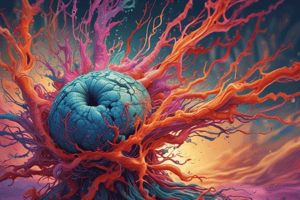Podcast
Questions and Answers
Which component is NOT part of the nervous system?
Which component is NOT part of the nervous system?
- Spinal cord
- Brain
- Heart (correct)
- Nerves
What is a primary function of the nervous system?
What is a primary function of the nervous system?
- Transporting oxygen in blood
- Producing hormones
- Digesting food
- Regulating body activities via action potentials (correct)
Which process is involved in the nervous system's response to changes in the environment?
Which process is involved in the nervous system's response to changes in the environment?
- Secretion of digestive enzymes
- Absorption of nutrients
- Breathing regulation
- Causing muscular contractions or glandular secretions (correct)
How does the nervous system detect changes in the body's environment?
How does the nervous system detect changes in the body's environment?
What role does the nervous system play in interpreting changes?
What role does the nervous system play in interpreting changes?
Which of the following most accurately describes a primary role of the nervous system in terms of environmental changes?
Which of the following most accurately describes a primary role of the nervous system in terms of environmental changes?
What is the significance of action potentials within the nervous system?
What is the significance of action potentials within the nervous system?
Which component of the nervous system is primarily responsible for interpreting environmental changes?
Which component of the nervous system is primarily responsible for interpreting environmental changes?
In what way does the nervous system respond after interpreting changes in its environment?
In what way does the nervous system respond after interpreting changes in its environment?
Which of the following functions is NOT associated with the nervous system?
Which of the following functions is NOT associated with the nervous system?
Flashcards are hidden until you start studying
Study Notes
Nervous System Components
- Comprises the brain, spinal cord, and peripheral nerves, forming the central and peripheral nervous systems.
- Includes special sense organs like the eyes and ears, which play a crucial role in sensory perception.
Functions of the Nervous System
- Generates action potentials, the electrical signals that regulate various physiological activities throughout the body.
- Detects changes in both the internal environment (e.g., hormonal levels, temperature) and external environment (e.g., light, sound).
- Interprets sensory information to understand and assess the body's condition and surroundings.
- Initiates responses by causing muscular contractions for movement or stimulating glandular secretions for various bodily functions.
Nervous System Components
- Comprises the brain, spinal cord, and peripheral nerves, forming the central and peripheral nervous systems.
- Includes special sense organs like the eyes and ears, which play a crucial role in sensory perception.
Functions of the Nervous System
- Generates action potentials, the electrical signals that regulate various physiological activities throughout the body.
- Detects changes in both the internal environment (e.g., hormonal levels, temperature) and external environment (e.g., light, sound).
- Interprets sensory information to understand and assess the body's condition and surroundings.
- Initiates responses by causing muscular contractions for movement or stimulating glandular secretions for various bodily functions.
Studying That Suits You
Use AI to generate personalized quizzes and flashcards to suit your learning preferences.




